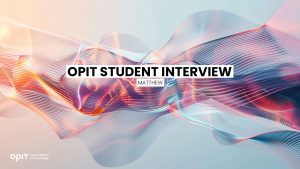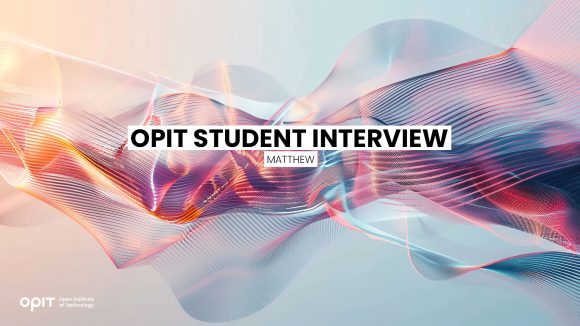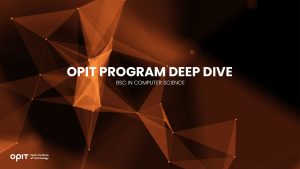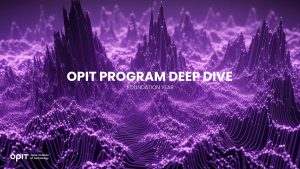

Quality of faculty: that’s what compelled Matthew Belcher, an independent freelance web developer and student working towards a Bachelor in Computer Science, to enroll in the Open Institute of Technology (OPIT), allowing him to work with some of the top professionals in his chosen industry.
Matthew was recently elected program representative for the course, helping to guide the interests of over 100 students across the globe in discussions with the area chair and director to ensure that the course is fit for purpose and meets student needs.
Why OPIT?
In a recent interview, Matthew told us that the reason he chose OPIT to continue his education was the expertise of the faculty. He shared that he conducted intensive research into a variety of programs that would help him shape his interest and skill in technology into potential career opportunities.
Matthew felt that the OPIT faculty stood out as not just great teachers, but top-tier professionals with real-world experience in the kinds of industries he wants to work in. Their professional roles mean they offer an up-to-the-minute understanding of the changing market.
The Computer Science Program
The BSc in Computer Science is a fully accredited course delivered completely online over six 13-week terms.
The program delivers foundational skills, both theoretical and practical, in all aspects of computer science, including programming, software development, databases, cloud computing, cybersecurity, data science, and artificial intelligence. Students deliver a dissertation or project in the final term, and in term five, they can choose five electives from a pool of 27, or choose to specialize in one of five fields:
- Data Science and Artificial Intelligence
- Cloud Computing
- Cybersecurity
- Metaverse and Gaming
- Full Stack Development
The BSc in Computer Science is aimed at students interested in software development and engineering, data science, web development, app and game development, IT business analysis, cybersecurity, and database architecture.
Meet the Faculty
Now let’s meet some of the incredible faculty who influenced Matthew’s decision to select OPIT.
Art Sedighi
As well as teaching at OPIT, Art Sedighi is an adjunct professor at Johns Hopkins University and a professor at Purdue University Global. He was previously a partner at CDI Global, a senior cybersecurity solution architect at Amazon AWS, and head of high-performance computing and grid engineering at the Bank of America.
Sedighi has 20 years of experience planning, designing, developing, and having end-to-end ownership of cloud solutions. He has managed cross-functional teams and been responsible for driving adoption strategies across enterprises.
Sedighi teaches software engineering and cloud adoption in the BSc in Computer Science and is also a professor in the BSc in Digital Business program.
Lokesh Vij
As well as teaching in OPIT’s Computer Science Program, Lokesh is a database architect at Broadcom Inc., a semiconductor manufacturing firm in Canada, and a part-time professor at Seneca Polytechnic in Toronto.
Vij describes himself as a cloud and data evangelist, educator, and mentor. With over 20 years of rich experience, he has designed, developed, and delivered enterprise-scale data solutions across disparate source systems, data formats, and relational and non-relational databases.
His proven expertise includes enhancing business profitability by leveraging insights derived from diverse data sets, constructing decision support systems that convert transactional data into analytical formats. This, combined with data visualization techniques, allows him to articulate and clarify business insights effectively.
In the BSc in Computer Science program, he teaches cloud computing infrastructure, cloud development, cloud computing automation and ops, and cloud data stacks. He is also a professor of the BSc in Digital Business and the MSc in Applied Data Science & AI, also covering big data and cloud computing.
Tom Vazdar
Tom Vazdar is OPIT’s area chair for cybersecurity and also the CEO of Riskoria, which focuses on cybersecurity strategies. His areas of expertise include strategy services, AI and cybersecurity, AI infrastructure development, and compliance assurance and risk management.
Vazdar teaches computer security in both the BSc in Computer Science and the BSc in Digital Business programs, as well as for the MSc in Enterprise Cybersecurity.
Sylvester Kaczmarek
Sylvester Kaczmarek is a former Chief Science Officer at WeSpace Technologies and a former AI Mentor and Researcher at NASA. He is now an independent executive leading secure, safe, and resilient AI-driven space innovations, a science communicator, and an advisor to deep tech investors, governments, and startups.
In the past, he has specialized in the integration of artificial intelligence, robotics, cybersecurity, and edge computing in aerospace applications.
In OPIT’s BSc in Computer Science program, Kaczmarek teaches cartography and secure communications, secure software development, and parallel and distributed computing. He also teaches in the MSc in Enterprise Cybersecurity program.
Lorenzo Marvardi
As well as teaching at OPIT, Lorenzo Marvardi is a managing director at Accenture. With a background in cybersecurity management and security consulting, he has 15 years of experience as a security professional and executive, implementing security programs across different industries and geographies.
Marvardi teaches cybersecurity in both the BSc in Computer Science and the BSc in Digital Business programs.
Khaled Elbehiery
Khaled Elbehiery is a senior director and network engineer at Charter Communications. As well as teaching for OPIT, he is a part-time professor at Park University and DeVry University, both in the United States.
He describes himself as a professor, scientist, inventor, and author. He has publications on cloud engineering, quantum computing, space, robotics, bionics, microgravity, and modern educational methodologies.
Elbehiery teaches cloud and IoT security and computer networks on both the BSc in Computer Science and the MSc in Enterprise Cybersecurity programs.
Francesco Derchi
Francesco Derchi is a brand, innovation, and digital expert with over 14 years of experience. He is chair of digital business at OPIT, an advisory board member for Arsene Lippens, on the faculty at EHL in Switzerland and the Universita degli Studi di Genova, plus course director and contributor to the Harvard Business Review Italia.
Derchi teaches business strategy and digital marketing on both the BSc in Computer Science and the BSc in Digital Business, as well as on the MSc in Digital Business and Innovation.
Related posts

Computer Science is fast becoming one of the most valuable fields of study, with high levels of demand and high-salaried career opportunities for successful graduates. If you’re looking for a flexible and rewarding way to hone your computing skills as part of a supportive global community, the BSc in Computer Science at the Open Institute of Technology (OPIT) could be the perfect next step.
Introducing the OPIT BSc in Computer Science
The OPIT BSc in Computer Science is a bachelor’s degree program that provides students with a comprehensive level of both theoretical and practical knowledge of all core areas of computer science. That includes the likes of programming, databases, cloud computing, software development, and artificial intelligence.
Like other programs at OPIT, the Computer Science BSc is delivered exclusively online, with a mixture of recorded and live content for students to engage with. Participants will enjoy the instruction of world-leading lecturers and professors from various fields, including software engineers at major tech brands and esteemed researchers, and will have many paths open to them upon graduation.
Graduates may, for example, seek to push on with their educational journeys, progressing on to a specialized master’s degree at OPIT, like the MSc in Digital Business and Innovation or the MSc in Responsible Artificial Intelligence. Or they could enter the working world in roles like software engineer, data scientist, web developer, app developer, or cybersecurity consultant.
The bullets below outline the key characteristics of this particular course:
- Duration: Three years in total, spread across six terms.
- Content: Core courses for the first four terms, a student-selected specialization for the fifth term, and a capstone project in the final term.
- Focus: Developing detailed theoretical knowledge and practical skills across all core areas of modern computer science.
- Format: Entirely online, with a mixture of live lessons and asynchronous content you can access 24/7 to learn at your own pace.
- Assessment: Progressive assessments over the course of the program, along with a capstone project and dissertation, but no final exams.
What You’ll Learn
Students enrolled in the BSc in Computer Science course at OPIT will enjoy comprehensive instruction in the increasingly diverse sectors that fall under the umbrella of computer science today. That includes a close look at emerging technologies, like AI and machine learning, as well as introductions to the fundamental skills involved in designing and developing pieces of software.
The first four terms are the same for all students. These will include introductions to software engineering, computer security, and cloud computing infrastructure, as well as courses focusing on the core skills that computer scientists invariably need in their careers, like project management, quality assurance, and technical English.
For the fifth term, students will have a choice. They can select five electives from a pool of 27, or select one field to specialize in from a group of five. You may choose to specialize in all things cybersecurity, for example, and learn about emerging cyber threats. Or you could focus more on specific elements of computer science that appeal to your interests and passions, such as game development.
Who It’s For
The BSc in Computer Science program can suit a whole range of prospective applicants and should appeal to anyone with an interest or passion for computing and a desire to pursue a professional career in this field. Whether you’re seeking to enter the world of software development, user experience design, data science, or another related sector, this is the course to consider.
In addition, thanks to OPIT’s engaging, flexible, and exclusively online teaching and learning systems, this course can appeal to people from all over the globe, of different ages, and from different walks of life. It’s equally suitable for recent high school graduates with dreams of making their own apps to seasoned professionals looking to broaden their knowledge or transition to a different career.
The Value of the BSc in Computer Science Course at OPIT
Plenty of universities and higher education establishments around the world offer degrees in computer science, but OPIT’s program stands out for several distinctive reasons.
Firstly, as previously touched upon, all OPIT courses are delivered online. Students have a schedule of live lessons to attend, but can also access recorded content and digital learning resources as and when they choose. This offers an unparalleled level of freedom and flexibility compared to more conventional educational institutions, putting students in the driving seat and letting them learn at their own pace.
OPIT also aims not merely to impart knowledge through lectures and teaching, but to actually help students gain the practical skills they need to take the next logical steps in their education or career. In other words, studying at OPIT isn’t simply about memorizing facts and paragraphs of text; it’s about learning how to apply the knowledge you gain in real-world settings.
OPIT students also enjoy the unique benefits of a global community of like-minded students and world-leading professors. Here, distance is no barrier, and while students and teachers may come from completely different corners of the globe, all are made to feel welcome and heard. Students can reach out to their lecturers when they feel the need for guidance, answers, and advice.
Other benefits of studying with OPIT include:
- Networking opportunities and events, like career fairs, where you can meet and speak with representatives from some of the world’s biggest tech brands
- Consistent support systems from start to finish of your educational journey in the form of mentorships and more
- Helpful tools to expedite your education, like the OPIT AI Copilot, which provides personalized study support
Entry Requirements and Fees
To enroll in the OPIT BSc in Computer Science and take your next steps towards a thrilling and fulfilling career in this field, you’ll need to meet some simple criteria. Unlike other educational institutions, which can impose strict and seemingly unattainable requirements on their applicants, OPIT aims to make tech education more accessible. As a result, aspiring students will require:
- A higher secondary school leaving certificate at EQF Level 4, or equivalent
- B2-level English proficiency, or higher
Naturally, applicants should also have a passion for computer science and a willingness to study, learn, and make the most of the resources, community, and support systems provided by the institute.
In addition, if you happen to have relevant work experience or educational achievements, you may be able to use these to skip certain modules or even entire terms and obtain your degree sooner. OPIT offers a comprehensive credit transfer program, which you can learn more about during the application process.
Regarding fees, OPIT also stands out from the crowd compared to conventional educational institutions, offering affordable rates to make higher tech education more accessible. There are early bird discounts, scholarship opportunities, and even the option to pay either on a term-by-term basis or a one-off up-front fee.

The Open Institute of Technology (OPIT) provides a curated collection of courses for students at every stage of their learning journey, including those who are just starting. For aspiring tech leaders and those who don’t quite feel ready to dive directly into a bachelor’s degree, there’s the OPIT Foundation Program. It’s the perfect starting point to gain core skills, boost confidence, and build a solid base for success.
Introducing the OPIT Foundation Year Program
As the name implies, OPIT’s Foundation Program is about foundation-level knowledge and skills. It’s the only pre-bachelor program in the OPIT lineup, and successful students on this 60-ECTS credit course will obtain a Pre-Tertiary Certificate in Information Technology upon its completion. From there, they can move on to higher levels of learning, like a Bachelor’s in Digital Business or Modern Computer Science.
In other words, the Foundation Program provides a gentle welcome into the world of higher technological education, while also serving as a springboard to help students achieve their long-term goals. By mixing both guided learning and independent study, it also prepares students for the EQF Level 4 experiences and challenges they’ll face once they enroll in a bachelor’s program in IT or a related field.
Here’s a quick breakdown of what the OPIT Foundation Program course involves:
- Duration: Six months, split into two terms, with each term lasting 13 weeks
- Content: Three courses per term, with each one worth 10 ECTS credits, for a total of 60
- Focus: Core skills, like mathematics, English, and introductory-level computing
- Format: Video lectures, independent learning, live sessions, and digital resources (e-books, etc.)
- Assessment: Two to three assessments over the course of the program
What You’ll Learn
The OPIT Foundation Program doesn’t intensely focus on any one particular topic, nor does it thrust onto you the more advanced, complicated aspects of technological education you would find in a bachelor’s or master’s program. Instead, it largely keeps things simple, focusing on the basic building blocks of knowledge and core skills so that students feel comfortable taking the next steps in their studies.
It includes the following courses, spread out across two terms:
- Academic Skills
- Mathematics Literacy I
- Mathematics Literacy II
- Internet and Digital Technology
- Academic Reading, Writing, and Communication
- Introduction to Computer Hardware and Software
Encompassing foundational-level lessons in digital business, computer science, and computer literacy, the Foundation Program produces graduates with a commanding knowledge of common operating systems. Exploring reading and writing, it also helps students master the art of communicating their ideas and responses in clear, academic English.
Who It’s For
The Foundation Year program is for people who are eager to enter the world of technology and eventually pursue a bachelor’s or higher level of education in this field, but feel they need more preparation. It’s for the people who want to work on their core skills and knowledge before progressing to more advanced topics, so that they don’t feel lost or left behind later on.
It can appeal to anyone with a high school-level education and ambitions of pushing themselves further, and to anyone who wants to work in fields like computer science, digital business, and artificial intelligence (AI). You don’t need extensive experience or qualifications to get started (more on that below); just a passion for tech and the motivation to learn.
The Value of the Foundation Program
With technology playing an increasingly integral role in the world today, millions of students want to develop their tech knowledge and skills. The problem is that technology-oriented degree courses can sometimes feel a little too complex or even inaccessible, especially for those who may not have had the most conventional educational journeys in the past.
While so many colleges and universities around the world simply expect students to show up with the relevant skills and knowledge to dive right into degree programs, OPIT understands that some students need a helping hand. That’s where the Foundation Program comes in – it’s the kind of course you won’t find at a typical university, aimed at bridging the gap between high school and higher education.
By progressing through the Foundation Program, students gain not just knowledge, but confidence. The entire course is aimed at eliminating uncertainty and unease. It imbues students with the skills and understanding they need to push onward, to believe in themselves, and to get more value from wherever their education takes them next.
On its own, this course won’t necessarily provide the qualifications you need to move straight into the job market, but it’s a vital stepping stone towards a degree. It also provides numerous other advantages that are unique to the OPIT community:
- Online Learning: Enjoy the benefits of being able to learn at your own pace, from the comfort of home, without the costs and inconveniences associated with relocation, commuting, and so on.
- Strong Support System: OPIT professors regularly check in with students and are on hand around the clock to answer queries and provide guidance.
- Academic Leaders: The OPIT faculty is made up of some of the world’s sharpest minds, including tech company heads, experienced researchers, and even former education ministers.
Entry Requirements and Fees
Unlike OPIT’s other, more advanced courses, the Foundation Program is aimed at beginners, so it does not have particularly strict or complex entry requirements. It’s designed to be as accessible as possible, so that almost anyone can acquire the skills they need to pursue education and a career in technology. The main thing you’ll need is a desire to learn and improve your skills, but applicants should also possess:
- English proficiency at level B2 or higher
- A Secondary School Leaving Certificate, or equivalent
Regarding the fees, OPIT strives to lower the financial barrier of education that can be such a deterrent in conventional education around the world. The institute’s tuition fees are fairly and competitively priced, all-inclusive (without any hidden charges to worry about), and accessible for those working with different budgets.
Given that all resources and instruction are provided online, you can also save a lot of money on relocation and living costs when you study with OPIT. In addition, applicants have the option to pay either up front, with a 10% discount on the total, or on a per-term basis, allowing you to stretch the cost out over a longer period to ease the financial burden.
Have questions?
Visit our FAQ page or get in touch with us!
Write us at +39 335 576 0263
Get in touch at hello@opit.com
Talk to one of our Study Advisors
We are international
We can speak in:


